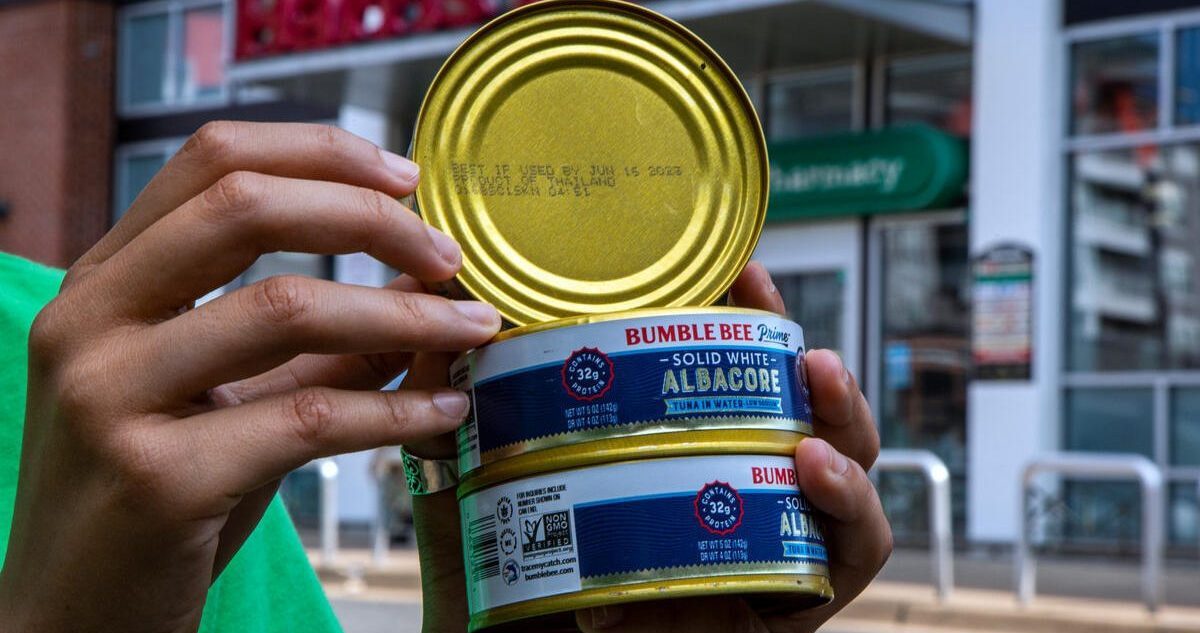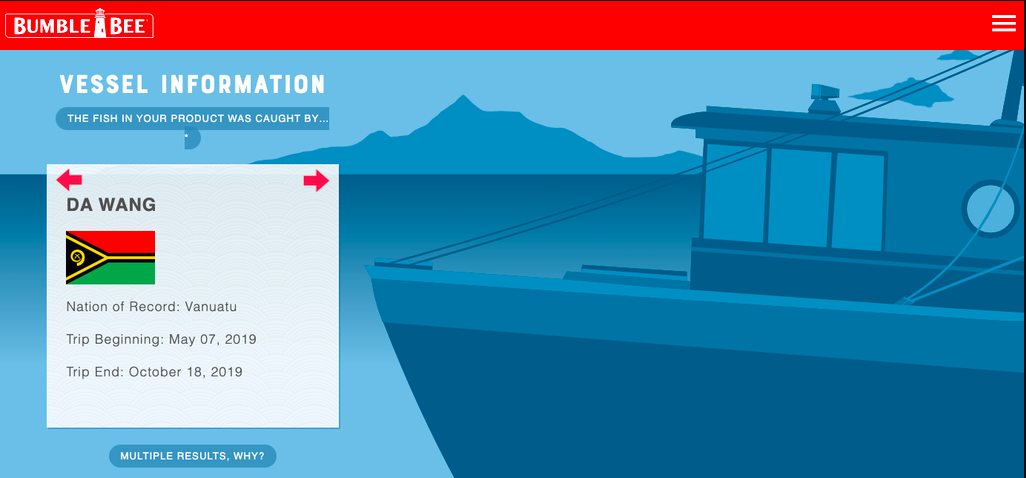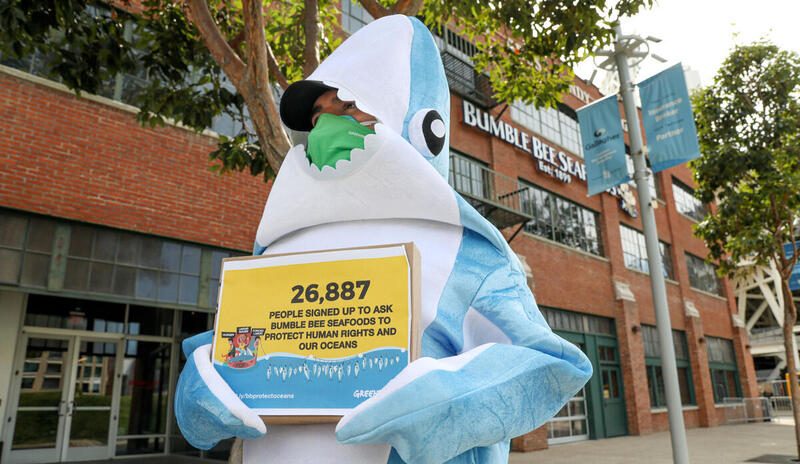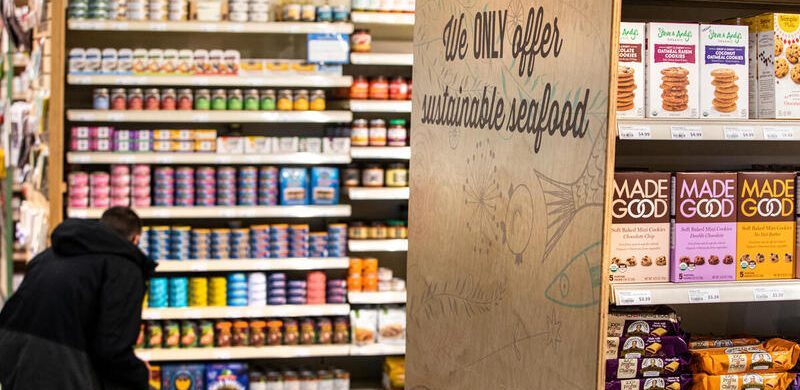Bumble Bee Tuna must heed the demands of the thousands of Americans asking them to clean up their supply chain, protect the rights of workers, and safeguard our oceans.

TW: This blog includes mention of physical abuse
Bumble Bee Tuna is making waves again! But, sadly, not for any of the reasons we would hope, like taking meaningful action to fulfill their promises on corporate social responsibility and sustainability to people and planet — promises that are supposed to extend through their supply chain.
Their latest marketing campaign is full of happy, smiling people, enjoying a taste of the products they confidently tout as healthy, nutritious, and “Good For You.” But a recent Greenpeace East Asia report has once again found that Bumble Bee may not be telling us the whole story. Fake My Catch: the unreliable traceability in our tuna cans finds that Bumble Bee is not doing enough to keep forced labor and environmental destruction out of their supply chain. After reading the report, we can’t help but wonder — Bumble Bee: #GoodForWho?
The report finds that of a sampling of 119 Taiwanese-flagged/owned vessels that supplied Bumble Bee, over 10% (13) had violated Taiwan Fishery Agency regulations and were on their Illegal, Unreported, and Unregulated (IUU) list. The report also alleges that some vessels supplying Bumble Bee had reportedly engaged in shark finning and illegal fishing. Additionally, Greenpeace East Asia’s interviews with fishers who worked aboard some of the vessels supplying Bumble Bee revealed that workers reportedly labored excessive overtime hours while having their wages withheld. Others stated that their documents were retained, a practice sometimes used by vessel operators or manning agencies to deter or prevent fishers from leaving or terminating their contracts early.
And, unfortunately, it doesn’t stop there. What was particularly alarming to learn was that a canned Bumble Bee product I picked up at my neighborhood grocery store, Harris Teeter in Arlington, Virginia, contained fish sourced from the Da Wang — a vessel that was recently confirmed by US Customs & Border Protection to have employed forced labor.

Greenpeace research found that a Bumble Bee tuna can was sourced from DA WANG, a Taiwanese-owned fishing vessel that was confirmed to have indicators of forced labor by US Customs and Border Protection.
The stories that have emerged about the working conditions onboard the Da Wang have been nothing short of horrifying. Migrant fishers reported facing physical abuse onboard and one worker even died after an accident where he was reportedly hit on the back of the head. While an autopsy found the cause of the death was not directly linked to this incident, according to prosecutors it nonetheless prompted 19 foreign crew members to quit, reportedly because they couldn’t stand the physical abuse they were subjected to aboard the ship. In April this year, the vessel’s captain, first mate, and seven others were indicted by Taiwanese authorities for their involvement in forced labor and human trafficking.
Note: This video belongs to Greenpeace East Asia
That Bumble Bee is sourcing from a vessel with such a horrible track record is not surprising. For years, the Greenpeace network has monitored and documented the widespread occurrence of human rights abuses in the seafood supply chain. Investigative reports and case studies from a wide variety of other sources, including the New York Times, have also revealed how common issues like long working hours, deplorable working conditions, wage theft, and even physical abuse are in this distant water fishing industry. Bumble Bee and its Taiwanese parent company, Fong Chun Formosa (FCF), have previously been linked to these issues in their supply chain.
Given this history, and my own recent discovery of a can of tuna possibly tainted with human rights abuse on the shelf of the supermarket in my neighborhood, we must question how many more such cans are being sold in supermarkets across the U.S. What this report makes clear though, is that Bumble Bee’s own transparency tool, Trace My Catch, which allows consumers to track where and how its tuna was caught, is not going to help us get answers to these questions. The information shared on this site is sometimes not only insufficient but also incorrect — making this tool a mere smokescreen for transparency.

Screenshot from Bumble Bee’s “Trace My Catch” showing that it sourced tuna from Da Wang
Bumble Bee cannot claim to be unaware of these issues. In March 2021, after several months of advocacy, Greenpeace delivered a petition signed by thousands of Americans, demanding that the corporation take action to prevent these abuses. Bumble Bee failed to meaningfully respond. And while they have since quietly updated their supplier code of conduct to include some language against forced labor, their efforts have been far from enough. Yet, this has done nothing to dampen the zeal with which they continue to market their commitments to responsible and sustainable sourcing, in a bid for consumer trust and confidence.

Greenpeace advocates, one dressed in a shark costume, delivered a petition demanding that Bumble Bee protect human rights on behalf of over 25,000 signers.
Americans want better. We want to know that the seafood we’re eating is sourced sustainably. Bumble Bee, as one of the leading companies in the canned tuna market, and FCF, one of the top three global tuna traders, play important roles in the global tuna industry. They have the power to impact the health of our oceans and the lives of fishers at sea.

Greenpeace Oceans Director John Hocevar looks at canned tuna on a store shelf.
As a first step towards this, Bumble Bee and FCF must ensure more transparency in their supply chain and provide information that is comprehensive, correct, and readily available. They must also heed the demands of the thousands of Americans asking them to clean up their supply chain, protect the rights of workers, and safeguard our oceans.
Now THAT truly would not only be “Good For You” but good for people and the planet.
Take action now: Tell Bumble Bee Tuna to protect workers in its supply chain and safeguard our oceans!
